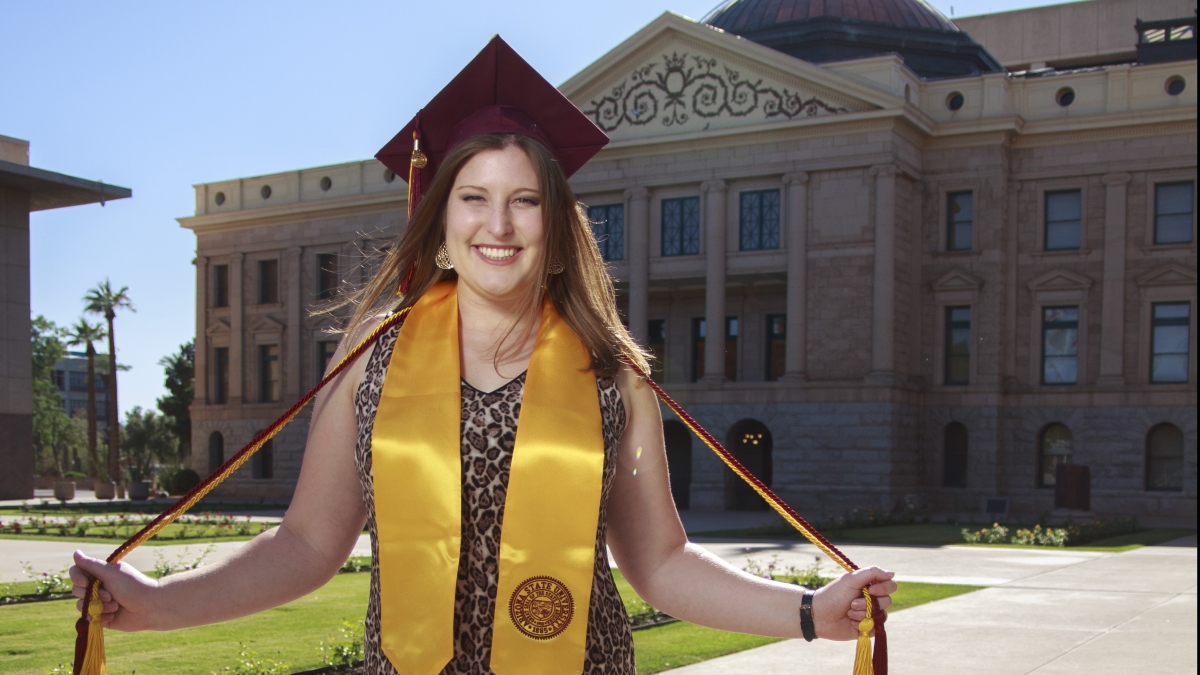Change maker hopes to use public policy to live university charter long after graduation

Aly Perkins. Photo by Nicole Hernandez
Editor’s note: This is part of a series of profiles for spring 2019 commencement.
Aly Perkins’ academic transcript bears the look of a young scholar in a hurry to get to the next level. Her success in advanced placement classes gave her a large head start in college. The Arizona State University graduate completed her bachelor’s degree in three years.
But Perkins does more with her time than most. While the pace of her academic career is impressive, it’s the passion behind all of her pursuits and the impact of her efforts that set her apart. During her relatively short stint at ASU, Perkins, of San Clemente, California, spent two sessions as an Arizona Senate page, was elected to student senate and then president of the Downtown Phoenix campus and made academic program history at ASU by becoming the first student to create a course certificate that will help advance an early understanding of law.
The brilliant thinker is a change maker. She’s also the spring 2019 outstanding graduate from Barrett, The Honors College, earning her degree from the School of Public Affairs in Watts College of Public Service and Community Solutions.
“Aly is someone who can change the world in a positive way. I think she already has,” said Joanna Lucio, associate dean of academic affairs for Watts College. “She’s someone who is so passionate about what she does. The effort she puts into her work really just shows how passionate she is.”
Three years ago, Perkins was on a path to advance her water polo career to the collegiate level. But, as is her habit, she examined many possibilities.
“There was something about ASU that made me reconsider my options and attend school without continuing with water polo,” Perkins said. “The Honors college especially was a big draw for me.”
Perkins is always drawn to a challenge. The motivation behind all those AP classes wasn’t to earn college credits, although that was a nice bonus. Perkins said she just wanted the academic challenge.
She got two other bonuses in enrolling in the School of Public affairs. Both were unexpected.
First, she recalls welcoming remarks from Watts College Dean Jonathan Koppell who touted the ASU Charter.
“I remember thinking to myself, ‘This is interesting. I wasn’t really expecting this coming here. My goal was to just get a degree and go to law school. I’m not sure what the public service element has to do with anything. I’m kind of confused by the emphasis on inclusivity.’
“But, really, the work that I’ve been able to do with both student government and just being in the school environment for three years has really taught me the importance of that inclusivity,” Perkins said. “I don’t view society the same any more. My worldview is different.”
Different, she said, in a way that makes her hopeful and concerned.
“I’m going to try to do my part to make sure the philosophy of the charter is carried out past ASU,” Perkins said.
The second unexpected bonus came when she dove into her course of study.
“I chose public policy in particular because I always knew I wanted to go to law school,” she said. “To me, it felt like this degree program would be the best fit for preparing me for law school, but it turns out that I love public policy for what it is so much more than I ever anticipated.”
There’s enough love for public policy and ASU for Perkins to want to spend time more time in the Valley. Upon graduation, she’ll work in the ASU Office of Government and Community Relations. Law school can wait a few years, she said.
Perkins has no strong desire to become a lawyer. Her determination to go to law school comes from a realization early in life about the impact laws have on individuals and society.
“[The law] is applicable to everyone’s life,” Perkins said. “Whether or not you pay attention to it, it doesn’t matter because it’s paying attention to you. The way it touches everyone’s life is really interesting to me.”
Spending time at the Arizona Capitol, getting an up close and personal look at political process and policy development, reinforced that impression.
“I don’t have a particular [law] specialization in mind. I don’t even want, at this point, to even practice law as your typical lawyer. I really want to be a lobbyist or an advocate with a JD.”
Lucio, who was Perkins’ honors thesis chairperson, thinks ahead five or 10 years to whatever challenge Perkins has in her sights. The possibilities seem endless.
“She can do anything,” Lucio said. “But I see her making successful change in government policies. She’s going to law school so she can really learn the tools that she needs … to work in the government in some capacity. I wouldn’t be surprised if it’s state or federal government fighting for changes that need to be done.”
Story by Jennifer Dokes
More Law, journalism and politics

How to watch an election
Every election night, adrenaline pumps through newsrooms across the country as journalists take the pulse of democracy. We…
Law experts, students gather to celebrate ASU Indian Legal Program
Although she's achieved much in Washington, D.C., Mikaela Bledsoe Downes’ education is bringing her closer to her intended…

ASU Law to honor Africa’s first elected female head of state with 2025 O’Connor Justice Prize
Nobel Peace Prize laureate Ellen Johnson Sirleaf, the first democratically elected female head of state in Africa, has been named…